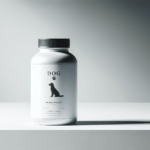
In “Maintaining a Healthy Canine: Essential Practices for Dog Owners,” you’ll learn the vital steps to ensure your furry friend lives a happy and healthy life. By focusing on the well-being of your dog, this guide covers various essentials from choosing the best diet and supplements, like omega-3 fatty acids and glucosamine, to maintaining dental health and ensuring regular veterinary check-ups. You’ll discover how to tailor your care based on your dog’s breed, age, and specific health needs, and get tips on using natural remedies and high-quality products. Staying updated with vaccination schedules and providing support for joint and skin health are just some of the ways you can help maintain your canine companion’s health and vitality. Have you ever wondered what it takes to keep your furry friend in top-notch health? As a dog owner, ensuring your canine companion leads a healthy and happy life is one of the most rewarding responsibilities you can have. Dogs bring joy, loyalty, and companionship into our lives, and in return, it’s our duty to take the best care of them possible. Let’s dive deep into the essential practices every dog owner should know to maintain a healthy canine.

Understanding Your Dog’s Basic Needs
Dogs, like humans, have fundamental needs that must be met to ensure their overall health and well-being. These include proper nourishment, regular veterinary care, physical exercise, mental stimulation, and lots of love and affection.
Proper Nourishment
Feeding your dog a balanced diet tailored to their specific needs is paramount. Different breeds, ages, and health conditions often require specific nutritional considerations.
Key Nutrients for Dogs
| Nutrient | Importance |
|---|---|
| Proteins | Essential for growth, muscle repair, and immune function. |
| Fats | Provide energy and support cell function and skin health. |
| Carbohydrates | Source of energy and aid in digestive health. |
| Vitamins and Minerals | Support various bodily functions and prevent deficiencies. |
Regular Veterinary Care
Regular check-ups with a veterinarian can help catch potential health issues before they become serious. Vets can provide vaccinations, dental cleanings, and tailored advice specific to your dog’s needs. Always talk to your vet before giving your dog any supplements or medications.
The Importance of Physical and Mental Exercise
Physical Exercise
Active dogs are healthy dogs. Regular physical activity helps maintain a healthy weight, strengthens muscles, and promotes cardiovascular health. The type and amount of exercise vary by breed, age, and overall health. For instance, a young, energetic breed like a Border Collie will need more intense exercise compared to an older, smaller breed like a Chihuahua.
Mental Stimulation
Dogs also thrive on mental challenges. Engaging your dog in activities that stimulate their mind helps prevent boredom, reduces anxiety, and promotes a happier demeanor. Try puzzle toys, learning new tricks, or even setting up a scavenger hunt with their favorite treats.
Using Supplements to Support Canine Health
Canine Wellness Supplements
Supplements can address specific health needs or support overall health. Some popular supplements include:
Common Canine Supplements
| Supplement | Benefits |
|---|---|
| Omega-3 Fatty Acids | Improves skin and coat health, supports joint function and heart health. |
| Glucosamine and Chondroitin | Supports joint health and helps with arthritis symptoms. |
| Probiotics | Aids in digestive health and boosts the immune system. |
| Multivitamins | Ensures dogs get essential nutrients that might be missing from their diet. |
Natural and Organic Health Products
Opting for natural and organic products can be beneficial as they often contain fewer chemicals and fillers, reducing the risk of adverse reactions. Look for products with the NASC Quality Seal to ensure the highest quality ingredients.
Maintaining Skin and Coat Health
A shiny coat and healthy skin are indicators of a well-maintained dog. Regular grooming, a balanced diet, and appropriate supplements all contribute to this.
Grooming Practices
Regular brushing not only keeps your dog’s coat tangle-free but also helps distribute natural oils that keep the coat glossy. Bathing your dog with a gentle, dog-specific shampoo can also help maintain skin health.
Supporting Skin Health with Diet
Including Omega-3 fatty acids in your dog’s diet can do wonders for their skin and coat. These fatty acids help reduce inflammation and itching, promoting a healthy, shiny coat.

Dental Health: More Than Just a Pretty Smile
Dental health is often overlooked but is critical to a dog’s overall well-being. Poor dental hygiene can lead to periodontal disease, which can affect vital organs.
Daily Care
Brushing your dog’s teeth daily is ideal, but a few times a week is still beneficial. Use toothpaste formulated specifically for dogs, as human toothpaste can be harmful.
Dental Products
There are numerous dental products like chews, toys, and additives formulated to support oral health. These can be effective supplements to regular brushing.
Addressing Joint and Mobility Issues
Joint health is particularly crucial for senior dogs or those predisposed to joint issues. Including supplements like glucosamine and chondroitin can help maintain healthy joints and support a normal inflammatory response.
Supportive Joint Supplements
| Supplement | Key Benefit |
|---|---|
| Glucosamine | Helps in the repair and regeneration of cartilage. |
| Chondroitin | Supports joint elasticity and prevents cartilage breakdown. |
| Omega-3 Fatty Acids | Reduces inflammation and promotes joint flexibility. |

Ensuring Proper Vaccination and Preventative Care
Vaccinations are essential in protecting your dog from various infectious diseases. Follow the vaccination schedule recommended by your veterinarian, which typically includes:
Core Vaccinations
| Vaccine | Protection Against |
|---|---|
| Rabies | Rabies virus |
| Distemper | Canine distemper virus |
| Parvovirus | Canine parvovirus |
| Adenovirus | Infectious hepatitis |
Non-Core Vaccinations
Depending on your dog’s lifestyle and exposure risk, your vet might recommend additional vaccinations like the Bordetella vaccine, especially if your dog frequents kennels or doggy daycares.
The Role of Probiotics in Canine Health
Probiotics promote a healthy digestive system by balancing the gut flora. They can be particularly beneficial for dogs experiencing digestive issues or those on antibiotics.
Dietary Supplements: Enhancing Your Dog’s Diet
While a complete and balanced diet is foundational, certain dietary supplements can further support your dog’s health. When choosing supplements, make sure they are designed to address specific needs such as normal heart function, immune support, or joint health.
Key Dietary Supplements
| Supplement | Primary Benefit |
|---|---|
| Fish Oil | Promotes heart health, skin, and coat condition. |
| Probiotics | Supports digestive and immune health. |
| Antioxidants | Helps combat oxidative stress and supports aging health. |
| Fiber Supplements | Aids in digestion and maintains bowel regularity. |
Recognizing and Addressing Specific Health Concerns
Dogs, like humans, can experience a variety of health issues. Being aware of and addressing these concerns promptly is crucial for maintaining your dog’s health.
Common Health Concerns
Health Concerns and Solutions
| Concern | Proactive Measures |
|---|---|
| Allergies | Identify allergens and provide hypoallergenic diets or supplements. |
| Obesity | Maintain a balanced diet and ensure regular exercise. |
| Arthritis | Include joint supplements and provide a supportive sleeping area. |
Consulting Health Experts
Always consider consulting with veterinary health experts regarding any specific health issues your dog may have. They can provide tailored recommendations and treatment plans.
Ensuring Overall Well-being and Happiness
A healthy dog is not just about physical health; emotional well-being plays a significant role too.
Love and Affection
Never underestimate the power of affection. Dogs thrive on human interaction, and a bond filled with love and care significantly contributes to their happiness.
Socialization
Socializing your dog with other dogs and people can help them develop confidence and reduce anxiety. This also promotes good behavior and adaptability.
Safe Environment
Providing a safe, secure, and stimulating environment is crucial. Make sure your home is dog-proofed, and provide plenty of toys and activities to keep your dog engaged.
Final Thoughts
Maintaining a healthy canine involves a holistic approach—addressing diet, exercise, mental stimulation, and regular veterinary care. By incorporating these essential practices, you can ensure your dog leads a happy, healthy, and fulfilling life. After all, a healthy dog is a happy dog, and there’s no greater reward for a pet owner than seeing their furry companion thrive.







